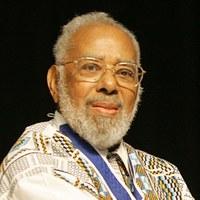Franca, 1914 – Río de Janeiro (Brasil), 2011
By Osmundo Pinho
Born on March 14, 1914, Abdias do Nascimento was the son of working-class parents—his mother a confectioner and his father a shoemaker—who encouraged him in the struggle against oppression. His activism initially took shape through participation in the Brazilian Black Front in São Paulo in the early 1930s. This was followed by the organization of the Afro-Campineiro Congress in 1938. A major milestone in his journey was the founding of the Black Experimental Theater (TEN) in 1944. While traveling through Latin America in 1941 as part of a theater group called La Santa Hermandad, Abdias attended a performance of Eugene O’Neill’s play The Emperor Jones in a theater in Lima. The main character was portrayed by a white actor in blackface. This experience was the triggering factor for the formation of the amateur group Black Experimental Theater, since such practices were also common in Brazil.
TEN’s primary goal was to insert Black people into Brazilian theater—as actors, directors, subjects, and participants. It debuted at the Municipal Theater of Rio de Janeiro on May 8, 1945, under the direction of Abdias do Nascimento, precisely with the play The Emperor Jones. In 1946, another work by O’Neill followed, All God’s Chillun Got Wings, directed by Aguinaldo Camargo.
The group remained active until the 1960s. Beyond theatrical productions, it organized seminars, meetings, and conferences. For example, in 1945 it held the National Convention of Black People, which published a manifesto demanding that racism be considered a crime against humanity. Its activities also included literacy courses, reaching around eight hundred people. It also published the newspaper Quilombo, which circulated from 1948 to 1952.
Fronts of Action
The founder of TEN was present and contributed to the organization of historic moments in the Brazilian Black social movement, such as the founding of the Unified Black Movement in 1978 and the National Conference Against Racism (2001), an official event in Brazil’s preparation for the Third World Conference Against Racism, Racial Discrimination, Xenophobia and Related Intolerance, held in Durban (South Africa) in 2001. Parallel to this, he built a career as a writer, journalist, actor, professor, visual artist, and speaker. Among his books, notable titles include: Sortilégio, Dramas para negros e prólogo para brancos, O negro revoltado, and O quilombismo. His literature is aimed at shaping a line of thought that places the anti-racist struggle at the center of reflections on Brazilian nationality.
In the political sphere, his career was marked by his election as a federal deputy for Rio de Janeiro in 1983. The following decade witnessed his participation in the Brazilian Senate as a substitute senator on two occasions, first in 1991 and again from 1997 to 1999. In both Houses, his speeches and legislative proposals always targeted the eradication of racism and support for Afro-Brazilians. He also served as Secretary of the Defense of the Promotion of Afro-Brazilian Populations in Rio de Janeiro from 1991 to 1994, and as State Secretary of Citizenship and Human Rights for São Paulo from 1999 to 2000.
The Voice of the Brazilian Black Movement
Abdias do Nascimento brought the demands and denunciations of the Brazilian Black movement to numerous international conferences. These include: the Pan-African Congress (1974); the Conference of Black African Intellectuals in Dakar (1974); the Congresses of Black Culture of the Americas (Cali, 1977; Panama, 1980); the World Symposium in Support of the Namibian People’s Struggle for Independence (New York, 1985); the 48th National Conference of the African National Congress (ANC) in South Africa, chaired by Nelson Mandela (1991).
His work in defending the rights of Afro-descendant populations earned him numerous honors, including: Honorary Doctorate from the State University of Rio de Janeiro, 1993; Honorary Doctorate from the Federal University of Bahia, 2000; Visiting Professor in the Department of African Languages and Literatures, University of Ife, Ile-Ife, Nigeria, 1976; Tiradentes Medal, State of Rio de Janeiro, 1991; Honorable Mention in Human Rights from the São Paulo Bar Association, 1997; World African Heritage Award from the Schomburg Center for Research in Black Culture, New York Public Library, Harlem, 2001; United Nations Commemorative Award for Outstanding Human Rights Services, also in 2001; Recognition Award 10 Years of Freedom – South Africa 1994–2004, in 2004.
In 2006, he received the Order of Rio Branco at the rank of Commander from the Brazilian government. In 2009, he was awarded the Human Rights Prize in the Racial Equality category by the Special Secretariat for Human Rights of the Presidency of the Republic. He was Professor Emeritus at the State University of New York and held honorary doctorates from the University of Brasília, Federal University of Bahia, State University of Bahia, State University of Rio de Janeiro, and Obafemi Awolowo University in Nigeria. In 2010, he was nominated for the Nobel Peace Prize. He died in the city of Rio de Janeiro on May 23, 2011. In 2013, as part of affirmative action policies, the Ministry of Education launched the Abdias do Nascimento Academic Development Program, which offers training and capacity-building to self-declared Black, Indigenous, and disabled students at universities, higher education institutions, and research centers in Brazil and abroad.



